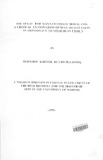| dc.description.abstract | From tile dawn or Philosophy the question concerning the Summum Bonum or what is the same thing, concerning the
foundation of morality. has been accounted the main problem in speculative thought. has occupied the most gifted intellects.
and divided them into sects and schools, carrying on a vigorous warfare against one another. And after more than two thousand
years the same discussions continue, philosophers are still ranged under the same contending banners and neither thinkers nor
mankind at large seem nearer to being unanimous on the subject ....(J. S. Mill. Utilitarianism. liberty and Representative
Govemment. 1863 .. PI)
In the light of the above observation, it is evident that the problem of the ultimate moral
purpose or end of human life, being essentially the basis of morality, is one that is
perennial and has proved to be insurmountable over the centuries. As a problem that is
central to human existence and destiny, it keeps on recurring from time to time and seems
to defy absolute resolution. The above postulation by lS Mill is a legitimate affirmation
that the fundamental question of the rationale of morality is indeed elusive and is still as
open an area of speculative thought as it has always been.It therefore becomes imperative
to undertake a comprehensive research with a view to establishing and determining
whether there is an ultimate moral purpose or end in human life and what this would be if
it were confirmed to be a reality. The greatest challenge in the research is to critically look
into, and definitely ascertain the veracity of the notion of a Summum Bonum on the
strength of the claims of the contending philosophers and lor their schools of thought. Of
particular interest is the theory of self- realization as advanced by Aristotle in the
Nicomachean Ethics.
Ascertaining the extent to which self - realization succeeds, in the Nicomachean Ethics, in
addressing and resolving the problem of the purpose or end of human life constitutes a
salient objective of the research. At the same time, the purpose of the research IS
embodied in the sole hypothesis thus stated: that there is an ultimate moral purpose, end
or goal in human life. First and foremost, the hypothesis has to be tested as it forms the
kernel of the research.
The critical process of testing the hypothesis has culminated in the conclusion that there is
indeed an ultimate moral purpose in"human life. This conclusion however only marks the
beginning of a far- reaching quest to determine what the nature of the hypothetical
ultimate moral end would actually be. The stated objectives have to be realized within the
context of the primary justification of the research which is to determine what the ultimate
moral end is and particularly to critically examine and decisively establish the extent to
which the theory of self- realization according to Aristotle would satisfy this goal.
The type of study is a library research and therefore a theoretical undertaking which relies
on the method of critical analysis of data. ln the quest to determine what the elusive
ultimate moral end is, the dialectical approach has been adopted. This approach first
entails an objective rendition of the arguments of specific philosophers and certain schools
of thought and consequently subjecting the same to a critical examination and appraisal on
the basis of the extent to which they satisfy the problem of the ultimate moral purpose in
human life. Utilitarianism, Kant's duty for its own sake, self- realization in Aristotle's
Nicomachean Ethics and the concept of happiness have been all subjected to a critical
review and each of them has been found to fall short of the stated objective in certain
respects. In this regard, the first three have been were disqualified as being largely
unsatisfactory .
In the final analysis, the concept of happiness has been singled out as the ultimate moral
end for man albeit in a modified sense. The main findings of the research are that there is
indeed an ultimate moral purpose for man and that this end is none other than happiness
which conforms to moral acts only. What is truly deemed as the ultimate moral end is
really the form of happiness which is realized through moral means only. This is the end
which men yearn for and strive to achieve in this life. More often than not they fail to
realize it because they are patently ignorant of what it constitutes. The sublime form of
happiness is a product of the morally conditioned way of life. The highest degree of
happiness is therefore possible only through the agency of morality. Once human beings
recognize that happiness essentially consists in, disagreements over this matter may
hopefully cease. However, it is with the empirical and provisionally ultimate happiness of
this life with which we are concerned. The transcendental, eternal happiness which is
articulated by the theologians is one that is beyond our cognitive abilities and therefore
unfathomable. | en |

